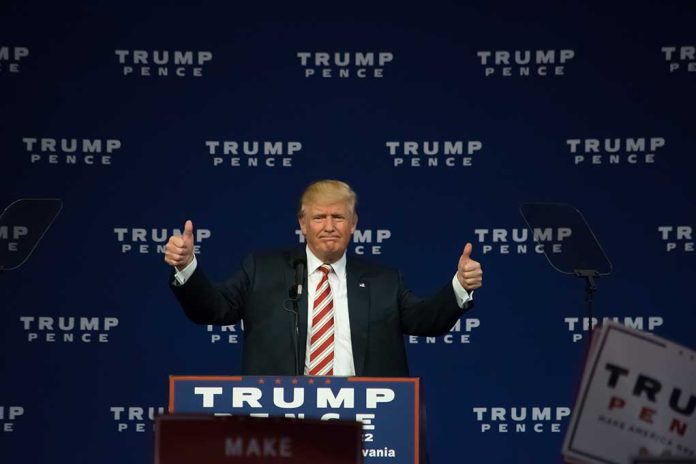
President-elect Donald Trump vows to overturn Biden’s offshore drilling ban, setting the stage for a dramatic shift in U.S. energy policy.
At a Glance
- Trump plans to reverse Biden’s recent ban on offshore oil and gas drilling in most U.S. coastal waters
- The move faces challenges including market forces, environmental concerns, and legal hurdles
- U.S. oil production growth may be limited due to economic caution and shifting global demand
- The policy shift highlights the ongoing debate between energy independence and environmental protection
Trump’s Day One Promise
In a bold declaration, President-elect Donald Trump has announced his intention to reverse President Joe Biden’s newly established ban on offshore oil and gas drilling. The prohibition, which covers vast stretches of America’s coastal waters, was implemented by Biden on January 6, just weeks before Trump’s scheduled inauguration on January 20. Trump’s stance on the matter is unequivocal, as evidenced by his statement:
“It’s ridiculous. I’ll unban it immediately. It’ll be changed on Day One.”
This move signifies a dramatic shift in U.S. energy policy, pitting Trump’s focus on bolstering domestic energy production against Biden’s emphasis on environmental protection.
Challenges to Increased Oil Production
Despite Trump’s ambitious plans, several factors may complicate his goal of significantly increasing U.S. oil production. The United States is already the world’s largest oil producer and gas exporter, making substantial production increases challenging. Economic caution among petroleum producers, the rise of fuel-efficient vehicles, and potential trade wars all pose obstacles to Trump’s energy objectives.
Moreover, oil companies are exercising caution about ramping up output without strong market demand. As noted by industry expert Bob Ryan:
“Oil producers in the U.S. — and in OPEC+ — have finally convinced investors they are not going to increase output if it erodes their profitability or fiscal positions.”
This focus on profitability over volume suggests that even with expanded access to drilling areas, significant production increases may not materialize.
President-elect Donald Trump vowed to reverse President Joe Biden's sweeping ban on offshore oil drilling. https://t.co/CGOfWrZbFi
— WKRG (@WKRG) January 9, 2025
Global Market Forces at Play
The global energy landscape is evolving rapidly, with implications for U.S. oil production and demand. Analysts predict limited U.S. oil supply growth, citing market forces and shareholder pressure as key factors. Furthermore, global gasoline demand is expected to peak due to the rising adoption of electric vehicles (EVs) and improvements in fuel efficiency.
China’s growing EV market is particularly significant, as noted by industry analyst Malcolm Forbes-Cable:
“Wherever you are, Chinese EVs are coming your way.”
This shift towards EVs, coupled with the International Energy Agency’s forecast of leveling global oil demand by 2030, suggests that the long-term outlook for oil production may be less robust than Trump’s policies anticipate.
Policy and Legal Hurdles
Trump’s plans to reverse Biden’s offshore drilling ban face several policy and legal obstacles. The ban, while largely symbolic as it affects areas already free from oil rigs, represents a significant environmental protection measure. Trump’s intention to expand federal land for drilling, including the Arctic National Wildlife Refuge, is likely to face fierce opposition from environmental groups and potentially lengthy legal battles.
Additionally, Trump’s proposed trade policies, including potential tariffs on Canada and Mexico, could disrupt oil imports and raise domestic fuel prices. Tariffs on imported steel could increase costs for oil companies, affecting projects and fuel demand. These factors, combined with possible changes to immigration policies impacting the oil industry’s labor pool, create a complex landscape for Trump’s energy agenda.
Trump is threatening to reverse President Biden's offshore drilling ban & expose NJ & other coastal states to the risks of a catastrophic oil spill that would devastate our environment & economy.
We will not stop fighting to preserve this ban & protect our oceans from drilling. https://t.co/Eqb3OH6L0m
— Rep. Frank Pallone (@FrankPallone) January 7, 2025
Looking Ahead
As Trump prepares to take office, the debate over U.S. energy policy continues to intensify. While his administration aims to prioritize energy independence and domestic production, market realities and environmental concerns present significant challenges. The coming months will likely see intense discussions and potential legal battles as the nation grapples with balancing energy needs, economic interests, and environmental stewardship.
Regardless of the outcome, this policy shift underscores the ongoing tension between different visions for America’s energy future, with implications that extend far beyond the oil and gas industry.
Sources:
- Trump’s oil promises have bigger problems than Biden’s new offshore drilling ban
- Trump’s energy plans face hurdles beyond Biden’s offshore drilling ban – EHN
- Trump says he will revoke Biden offshore drilling ban immediately | Reuters
- Trump vows to undo Biden’s ban on offshore drilling














